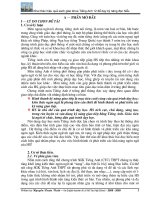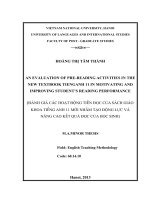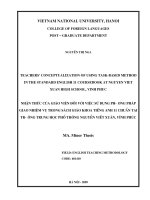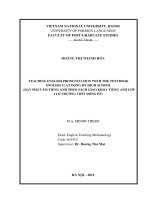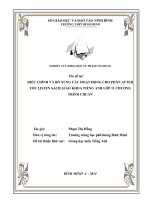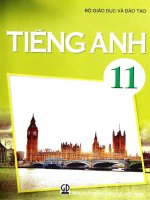sách giáo khoa tiếng anh 11 hoàng văn vân (tái bản)
Bạn đang xem bản rút gọn của tài liệu. Xem và tải ngay bản đầy đủ của tài liệu tại đây (34.24 MB, 200 trang )
Bộ GIáO DụC Và ĐàO TO
HOàNG VăN VÂN (Tổng Chủ biên kiêm Chủ biên)
hoàng th xuân hoa đàO NGọC LộC Vũ TH LợI
đỗ tuấn minh nguyễn quốc tuấn
NHà XUấT BảN GIáO DụC
692-2006/CXB/512-1530/GD
M· sè: CH120M7
B¶n quyÒn thuéc Nhµ xuÊt b¶n Gi¸o dôc − Bé Gi¸o dôc vµ §µo t◊o.
3
TIếNG ANH 11 đợc biên son dựa theo chơng trnh chuẩn
tiếng Anh Trung học phổ thông của Bộ Giáo dục và Đào to,
tiếp theo Tiếng Anh 10.
TIếNG ANH 11 đợc biên son theo chủ điểm (theme-based) gồm
16 đơn v bài học và 6 bài ôn tập. Mỗi đơn v bài học ứng với một
chủ đề cụ thể và gồm các mục sau:
A. Reading: Gồm một hoặc một số đon văn có độ dài khoảng
240 270 từ, nhằm giúp học sinh làm quen với chủ đề của đơn
v bài học, cung cấp thông tin và ngữ liệu cho toàn đơn v bài học
và phát triển các kĩ năng đọc hiểu cho các em.
B. Speaking: Gồm các hot động luyện kĩ năng nói theo các
chức năng ngôn ngữ và theo chủ đề của đơn v bài học, đợc trnh
bày qua các hot động giao tiếp nh thực hành nói theo cặp,
thảo luận theo nhóm và nói cá nhân.
C. Listening: Gồm các đon văn hay các đon thoi liên
quan đến chủ đề bài học. Mục đch của mục này là nhằm rèn
luyện các kĩ năng nghe hiểu của học sinh, củng cố và chỉnh sửa
li những sai lệch trong phát âm và trong các cấu trúc ngôn ngữ
của học sinh.
D. Writing: Gồm các nhiệm vụ hay các hot động nhằm
phát triển kĩ năng viết của học sinh theo các thể loi văn bản
khác nhau nh viết th cá nhân, th mời, miêu tả thông tin trong
biểu bảng, v.v
LờI NóI ĐầU
LờI NóI ĐầU
4
E. Language Focus: Gồm hai mục chnh, Pronunciation và
Grammar and vocabulary. Pronunciation nhằm rèn luyện cách phát âm
các cặp hay các chùm phụ âm có trong từ và trong phát ngôn đợc cho là
khó đối với học sinh. Grammar and vocabulary đề cập đến những vấn đề
từ vựng và ngữ pháp đợc cho là trọng tâm của đơn v bài học và của toàn
bộ chơng trnh tiếng Anh lớp 11. Những nội dung này đợc trnh bày dới
hnh thức bài tập hay hot động giao tiếp để học sinh thực hành.
Sáu bài ôn tập đợc trnh bày dới hnh thức Test Yourself và đợc
thực hiện sau mỗi chủ đề lớn đợc quy đnh trong chơng trnh chuẩn của
Bộ Giáo dục và Đào to. Các Test Yourself đợc thiết kế để giúp học
sinh tự kiểm tra khả năng và sự hiểu biết của mnh sau khi các em đã học
xong từ hai đến ba đơn v bài học (nghĩa là sau từ 10 đến 15 tiết học).
Điểm số của mỗi phần trong một Test Yourself đợc tnh nh sau:
Listening : 2,5 điểm
Reading : 2,5 điểm
Writing : 2,5 điểm
Language Focus : 2,5 điểm
Cuối sách là danh mục từ vựng đợc liệt kê theo từng đơn v bài học có
phiên âm và giải nghĩa tiếng Việt tơng đơng. Phần phiên âm đợc dựa
theo hệ thống các k hiệu phiên âm của từ điển Oxford Advanced Learners
Dictionary, in lần thứ 7, NXB Oxford.
Tập thể các tác giả hi vọng TIếNG ANH 11 sẽ mang li nhiều bổ ch cho
các em học sinh. Chúc các em thành công!
CáC táC Giả
5
Tower Bridge
Buckingham Palace
6
Reading Speaking
Unit 1
FRIENDSHIP
Page 12
l Guessing meaning in
context
l Identifying main idea
l Passage comprehension
l Describing physical
characteristics
l Discussing personalities
l Role-playing: Talking
about a famous friend
Unit 2
PERSONAL
EXPERIENCES
Page 22
l Guessing meaning in
context
l Understanding the sequence
of events in a story
l Passage comprehension
l Talking about past
experiences and how they
affected one’s life
Unit 3
A PARTY
Page 32
l Scanning for specific
information
l Identifying and correcting
false information
l Talking about parties and
how to plan parties
Unit 4
VOLUNTEER
WORK
Page 46
l Word formation
l Extensive reading:
multiple-choice questions
l Passage comprehension
l Identifying types of
volunteer work
l Asking and answering
questions about volunteer
work
l Talking about volunteer
work
Unit 5
ILLITERACY
Page 56
l Dictionary skills
l Identifying main idea
l Passage comprehension
l Talking about literacy
problems and offering
solutions
Unit 6
COMPETITIONS
Page 66
l Word meaning in context
l Passage comprehension
l Scanning for specific
information
l Asking for and giving
information about types
of competitions
l Talking about a
competition or contest
BOOK MAP l BOOK MAP l BOOK MAP l BOOK MAP
7
Listening Writing Language Focus
Monologue:
l Deciding on True or
False statements
l Listening and taking
notes
l Writing about a
friend
l Pronunciation:
/dZ/ /tS/
l Grammar:
− Ιnfinitive with to
− Ιnfinitive without to
Dialogue:
l Deciding on True or
False statements
l Gap-filling
l Writing a personal
letter to describe a
past experience
l Pronunciation:
/
m
/ /n/ /N/
l Grammar:
− Present simple indicating
past time
− Tense revision: past simple,
past progressive and past
perfect
Monologue:
l Deciding on True or
False statements
l Comprehension
questions
l Writing an informal
letter of invitation
l Pronunciation:
/l/ /
r
/ /
h
/
l Grammar:
−Ιnfinitive and gerund
− Passive infinitive and gerund
Monologue:
l Gap-filling
l Comprehension
questions
l Writing a formal
letter expressing
gratitude
l Pronunciation:
/w/ /
j
/
l Grammar:
− Gerund and present participle
− Perfect gerund and
perfect participle
Monologue:
l Extensive listening:
multiple-choice questions
l Comprehension
questions
l Describing
information in a
table
l Pronunciation:
/pl/ /bl/ /pr/ /br/
l Grammar:
− Reported speech with
infinitive(s)
Monologue:
l Deciding on True or
False statements
l Comprehension
questions
l Writing a letter of
reply
l Pronunciation:
/tr/ /dr/ /tw/
l Grammar:
− Reported speech with
gerund
BOOK MAP l BOOK MAP l BOOK MAP l BOOK MAP
8
Reading Speaking
Unit 7
WORLD
POPULATION
Page 80
l Guessing meaning in
context
l Passage comprehension
l Identifying causes to
population explosion
l Identifying problems
facing overpopulated
countries
l Working out solutions to
problems of overpopulated
countries
l Talking about problems of
overpopulation and
offering solutions
Unit 8
CELEBRATIONS
Page 90
l Dictionary skills
l Deciding on True or False
statements
l Passage comprehension
l Talking about the
celebration of Tet and
other festivals’ activities
Unit 9
THE POST
OFFICE
Page 100
l Word meaning: antonyms
l Passage comprehension
l Scanning for specific
information
l Making requests
l Talking about different
postal and
telecommunication
services
Unit 10
NATURE IN
DANGER
Page 114
l Guessing meaning in
context
l Identifying main idea
l Passage comprehension
l Talking about nature in
danger
l Talking about measures
for protecting endangered
nature
Unit 11
SOURCES OF
ENERGY
Page 124
l Identifying meaning in
context
l Scanning for information
l Passage comprehension
l Gap-filling
l Talking about advantages
and disadvantages of
energy sources
BOOK MAP l BOOK MAP l BOOK MAP l BOOK MAP
9
Listening Writing Language Focus
Monologue:
l Extensive listening:
multiple-choice
questions
l Comprehension
questions
l Summarizing main
ideas
l Interpreting
statistics on
population from
a chart
l Pronunciation:
/kl/ /gl/ /kr/ /gr/ /kw/
l Grammar:
− Conditional types 1 and 2
− Conditional type 3
− Conditional in reported
speech
Dialogue:
l Selective listening
l Comprehension
questions
l Describing a
celebration’s
activities
l Pronunciation:
/fl/ /fr/ /Tr/
l Grammar and vocabulary:
− Pronouns one(s), someone,
anyone, no one, everyone
− Vocabulary: words
describing celebrations
Monologue:
l Extensive listening:
multiple-choice
questions
l Comprehension
questions
l Writing a formal
letter to express
satisfaction or
dissatisfaction
l Pronunciation:
/
sp
/ /st/ /sk/
l Grammar:
− Defining relative clauses
(revision)
− Non-defining relative
clauses (revision)
Monologue:
l Deciding on True or
False statements
l Comprehension
questions
l Describing a
location
l Pronunciation:
/sl/ /
sm
/ /sn/ /sw/
l Grammar:
− Relative pronouns with
prepositions
Monologue:
l Extensive listening:
multiple-choice
questions
l Gap-filling
l Describing
information from a
chart
l Pronunciation:
/
Sr
/ /spl/ /spr/
l Grammar:
− Relative clauses replaced
by participles and to
infinitives (revision)
BOOK MAP l BOOK MAP l BOOK MAP l BOOK MAP
10
BOOK MAP l BOOK MAP l BOOK MAP l BOOK MAP
Reading Speaking
Unit 12
THE ASIAN
GAMES
Page 136
l Guessing meaning in
context
l Scanning for specific
information
l Passage comprehension
l Asking for and giving
information about the
Asian Games
l Talking about sports
results
Unit 13
HOBBIES
Page 146
l Dictionary skills:
explaining meaning in
context
l Passage comprehension
l Talking about a hobby
l Talking about collections
Unit 14
RECREATION
Page 154
l Guessing meaning in
context: multiple-choice
l Passage comprehension
l Expressing agreements
and disagreements about
entertainment activities
and stating the reasons
Unit 15
SPACE
CONQUEST
Page 166
l Identifying main ideas:
matching
l Passage comprehension
l Summarizing skills
l Asking and answering
questions on given
information
l Talking about historical
events in the space
conquest
Unit 16
THE WONDERs
OF THE WORLD
Page 178
l Guessing meaning in
context
l Passage comprehension
l Scanning for specific
information
l Distinguishing facts and
opinions
l Using facts and opinions
to talk about features of
man-made places
11
Listening Writing Language Focus
Monologue:
l Extensive listening:
multiple-choice
questions
l Comprehension
questions
l Describing the
preparations for the
coming Asian
Games
l Pronunciation:
/str/ /skr/ /skw/
l Grammar:
− Relative clauses (revision)
− Omission of relative
pronouns
Monologue:
l Deciding on True or
False statements
l Gap-filling
l Writing about a
collection
l Pronunciation:
/pt/ /bd/ /ps/ /bz/
l Grammar: Cleft sentences
− Subject focus
− Object focus
− Adverbial focus
Monologue:
l Deciding on True or
False statements
l Comprehension
questions
l Describing a
camping holiday
l Pronunciation:
/ts/ /dz/ /tSt/ /dZd/
l Grammar:
− Conjunctions: both and,
not only but also,
either or, neither nor
− Cleft sentences in the passive
Monologue:
l Deciding on True or
False statements
l Comprehension
questions
l Writing a
biography
l Pronunciation:
/nt/ /nd/ /nT/ /ns/ /nz/
l Grammar and vocabulary:
− Could /be able to
− Tag questions
l Gap-filling
l Comprehension
questions
l Writing a report on
a man-made place
l Pronunciation:
/ft/ /vd/ /fs/ /vz/
l Grammar:
− It is said that
− People say that
BOOK MAP l BOOK MAP l BOOK MAP l BOOK MAP
A. READING
Before you read
Work in pairs. Practise reciting the poem on the next page and discuss
the question: “What do you think of the friend in the poem?”
12
FRIENDSHIP
Unit
1
While you read
Read the passage and then do the tasks that follow.
Everyone has a number of acquaintances, but no one has many friends,
for true friendship is not common, and there are many people who
seem to be incapable of it. For a friendship to be close and lasting, both
the friends must have some very special qualities.
The first quality is unselfishness. A person who is concerned only with
his own interests and feelings cannot be a true friend. Friendship is a
two-sided affair; it lives by give-and-take, and no friendship can last
long which is all give on one side and all take on the other.
Constancy is the second quality. Some people do not seem to be
constant. They take up an interest with enthusiasm, but they are soon
tired of it and feel the attraction of some new object. Such changeable
and uncertain people are incapable of a lifelong friendship.
Loyalty is the third quality. Two friends must be loyal to each other,
and they must know each other so well that there can be no suspicions
between them. We do not think much of people who readily believe
rumours and gossip about their friends. Those who are easily
influenced by rumours can never be good friends.
13
You've got a friend!
When you're down and troubled
And you need a helping hand,
And nothing, no, nothing's going right
Close your eyes and think of me
And soon I will be there
To brighten up even your darkest night;
You just call out my name
And you know, wherever I am,
I'll come running, to see you again
Winter, Spring, Summer or Fall,
All you've got to do is call,
And I'll be there, yes I will,
You've got a friend!
by Carole King
Trust is perhaps the fourth quality. There must be mutual trust between
friends, so that each can feel safe when telling the other his or her
secrets. There are people who cannot keep a secret, either of their own
or of others’. Such people will never keep a friend long.
Lastly, there must be a perfect sympathy between friends - sympathy
with each other’s aims, likes, joys, sorrows, pursuits and pleasures.
Where such mutual sympathy does not exist, friendship is impossible.
Task 1. Fill each blank with a suitable word/phrase.
1. Good friendship should be based on ____________ understanding.
2. The children seem to be ______________ working quietly by
themselves.
3. He is a(n) _____________ man. He always helps people without
thinking of his own benefit.
4. A(n) _____________is a person one simply knows, and a(n)
_____________ is a person with whom one has a deeper
relationship.
5. You can’t always insist on your own way − there has to be some
_______________.
6. Despite many changes in his life, he remained __________ his
working principles.
7. He started to get _____________ when she told him that she had
been to Britain for many times.
Task 2. Which of the choices A, B, C, or D most adequately sums up
the ideas of the whole passage?
A. A friend in need is a friend indeed
B. Conditions of true friendship
C. Features of a good friend
D. Friends and acquaintances
acquaintance mutual give-and-take loyal to
incapable of unselfish friend suspicious
14
Task 3. Answer the questions.
1. What is the first quality for true friendship and what does it tell you?
2. Why are changeable and uncertain people incapable of true friendship?
3. What is the third quality for true friendship and what does it tell you?
4. Why must there be a mutual trust between friends?
5. Why can’t people who talk too much keep a friend long?
6. What is the last quality for true friendship and what does it tell you?
After you read
Work in pairs. Discuss the question: “Why do we need to have
friends?” Then report the results of your discussion to the class.
B. SPEAKING
Task 1. Work in pairs. Look at the people below and describe their
physical characteristics.
15
Useful language:
height tall, medium, short,
face square, large, oval,
forehead broad, high
nose straight, crooked,
hair black, grey,
appearance handsome, beautiful, good-looking,
Example:
A: Can you describe the man in the picture?
B: The man is tall. He has got a square face, a crooked nose
Task 2. Work in groups. Discuss and number the following
personalities in order of importance in friendship. Report your results
to the class.
caring sincere helpful
hospitable generous understanding
modest honest pleasant
Task 3. Role-play: Talk about a famous friend.
16
Journalist Interviewee
You are interviewing the
interviewee about a friend
of his or hers who has just
won the first international
prize in Mathematics.
You have a friend whom you
admire greatly. She/He has just
won the first international prize in
Mathematics. You are being
interviewed by a journalist about
him or her.
Before you start, agree upon the basic profile of the friend. Use the
following suggestions to ask and answer questions:
l his/her name l why he/she is interested in Maths
l date of birth l how much time he/she spends
l his/her physical characteristics on Maths every day
l his/her hobbies l what makes him/her a good friend
l his/her personalities l what made him/her successful
l what he/she does in his/her free time
Useful language:
His or her personalities:
friendly, humorous, quick-witted, good-natured, helpful, honest,
pleasant, caring
How he or she won the prize:
studious, intelligent, keenly interested in Mathematics, eager to learn,
patient, calm
C. LISTENING
Before you listen
l Work in pairs. Ask and answer the following questions.
1. Who is your best friend?
2. How did you happen to meet him or her?
3. How long have you known each other?
4. What qualities do you admire in your best friend?
l Listen and repeat.
apartment building guitarist motorbike
sense of humour favourite around
While you listen
You will hear Lan and Long talk about their best friends. Listen to their
talks and then do the tasks that follow.
17
Task 1. Listen and decide whether the statements are true (T) or false (F).
TF
Lan’s Talk
1. Ha and Lan shared an apartment in Nguyen Cong Tru
Residential Area in Hanoi.
2. Lan thinks that Haiphong people are unfriendly.
3. Lan spent two days in Do Son.
4. Ha took Lan to Do Son on her motorbike.
5. Ha introduced Lan to a number of her friends there.
6. Ha and Lan have become friends since Lan’s trip to Do Son.
Long’s Talk
1. Minh and Long have been friends since school.
2. Long was a guitarist.
3. Long loves Minh’s sense of humour.
4. They have a lot of things in common.
5. Minh always helped Long out of difficulties.
Task 2. Listen again and note down the ideas in the table below.
After you listen
Work in pairs. Take turns to talk about how Ha has been Lan’s best
friend and how Minh has been Long’s best friend.
18
How and where they met What they like about their friends
Lan
Long
D. WRITING
Write about a friend, real or imaginary, following these guidelines.
l give your friend’s name, age, sex and home address, when and where
you met him or her
l describe his/her physical characteristics (height, hair, eyes, face, clothes, )
and his/her personalities (helpful, sincere, )
l say what you like about him or her
E. LANGUAGE FOCUS
Pronunciation
l Listen and repeat.
/ dZ / / tS /
jam dangerous children mutual
joke passenger changeable church
January village cheese which
l Practise reading aloud these sentences.
1. Just outside the village, there’s a bridge.
2. Jane always enjoys George’s jokes.
3. Two jeeps went over the edge of the bridge.
4. Which picture do you think the child wants to change?
5. Mix the mushrooms, chilli and cheese.
6. Do you like French salad and fish and chips?
l Pronunciation: / dZ / − / tS /
l Grammar:
1. Infinitive with to
2. Infinitive without to
19
Grammar
Exercise 1. Put the words in the correct order to make sentences,
writing the main verb in the present simple and making the other an
infinitive with to.
Examples:
− train catch she a have
She has a train to catch.
− lot of a housework there be do
There is a lot of housework to do.
1. who something eat want?
______________________________________________________
2. letters I write some have.
______________________________________________________
3. delighted hear I be the news.
______________________________________________________
4. my shopping some mother do have.
______________________________________________________
5. always much talk have you too about.
______________________________________________________
6. lovely see it again you be.
______________________________________________________
7. out cold it go too be.
______________________________________________________
8. passed exams know happy I be that you have the.
______________________________________________________
20
Exercise 2. Rewrite the sentences, using the words given in brackets.
Examples:
− They arrived home late. (He saw)
He saw them arrive home late.
− She didn’t want to stay there for the weekend. (They made her)
They made her stay there for the weekend.
1. They got out of the car. (The police watched)
______________________________________________________
2. They allowed him to write a letter to his wife. (They let)
______________________________________________________
3. They talked in the next room. (I heard)
______________________________________________________
4. The customs officer told him to open the briefcase. (The customs
officer made)
______________________________________________________
______________________________________________________
5. The cat jumped through the window. (The boy saw)
______________________________________________________
6. Maybe the company will ask him to pay some extra money. (Do you
think the company will make)
______________________________________________________
______________________________________________________
7. The animal moved towards me, I felt it. (I felt)
______________________________________________________
8. She wants to go for a picnic. (Do you think her parents will let)
______________________________________________________
21
A. READING
Before you read
Work in pairs. Look at the pictures below and guess what is happening
in each of them.
22
PERSONAL EXPERIENCES
Unit
2
a
b
c
d
e
f
While you read
Read the story and then do the tasks that follow.
MY MOST EMBARRASSING EXPERIENCE
My most embarrassing experience happened a few years ago, when
I was a grade 9 student. In those days, my biggest dream was a red
hat – a floppy cotton hat like the one my pop star idol wore in her video
clip. I thought I would look great in it.
My father knew this, so on my birthday he gave me some money so
that I could buy the hat for myself. I was extremely excited and
decided to go to the shop at once. I got on the bus and sat down next
to a schoolboy about my age. The boy glanced at me and turned away.
There was a sneaky look on his face, but I didn’t think much about it.
I was busy imagining how I would look in the hat. After a while,
I turned round and noticed that the boy’s schoolbag was open. Inside
it, I saw a wad of dollar notes exactly like the ones my father had given
me. I quickly looked into my own bag – the notes had gone! I was sure
that the boy was a thief. He had stolen my money. I didn’t want to
make a fuss, so I decided just to take my money back from the
schoolboy’s bag, without saying a word about it. So I carefully put my
hand into the boy’s bag, took the notes and put them in my own bag.
With the money I bought the pretty hat of my dreams. When I got
home, I showed it to my father.
“How did you pay for it?” he asked.
“With the money you gave me for my birthday, of course, Dad”
I replied.
“Oh? What’s that then?” he asked, as he pointed to a wad of dollar
notes on the table.
Can you imagine how I felt then?
23
Task 1. The words/phrases in the box all appear in the passage. Use
them to fill the blanks in the sentences.
1. The girl was so shy that she didn’t look at him in the face. She just
________ at him and looked away.
2. She complains noisily about anything she doesn’t like. She is the
type of person who is always _______.
3. She was in a very _________ situation. She felt so stupid and didn’t
know what to say.
4. Teenagers nowadays often have their own ________ who they really
love and imitate in different ways.
5. I don’t like the look of that man. There is something ________ about
him.
Task 2. Work in pairs. Put the pictures of the events (on page 22) in
the order they happened in the story.
1. Picture 2. Picture 3. Picture
4. Picture 5. Picture 6. Picture
Task 3. Answer the questions.
1. What did the girl wish to have when she was in grade 9?
2. Why did her father give her some money on her birthday?
3. What did she see in the boy’s bag?
4. Why did she decide to take the money from the boy’s bag without
saying anything about it?
5. What did she do with the money?
making a fuss sneaky glanced embarrassing idols
24
After you read
Work in groups. Discuss the question: What do you think the girl had
to do after she discovered that the money she had taken from the boy’s
bag was not hers?
B. SPEAKING
Task 1. Work in pairs. Match the things you might have done or
experienced in box A with how the experience might have affected you
in box B.
Example: 1 – d
Task 2. Work in pairs. A student is talking to her friend about one of
her past experiences and how it affected her. The lines in their
conversation are jumbled. Put them in the correct order, then practise
the dialogue.
25
A B
1. speaking English to a
native English speaker
2. being seriously ill
3. travelling to other parts
of the country
4. failing an exam
5. talking to a famous
pop star
a. makes you love your country more
b. teaches you a lesson and makes you
study harder
c. makes you appreciate your health
more
d. makes you more interested in
learning English
e. changes your attitude to pop stars
